【精品】高二英语外研版选修六教学案:Module 6 Section 2 含答案
- 格式:doc
- 大小:233.00 KB
- 文档页数:17
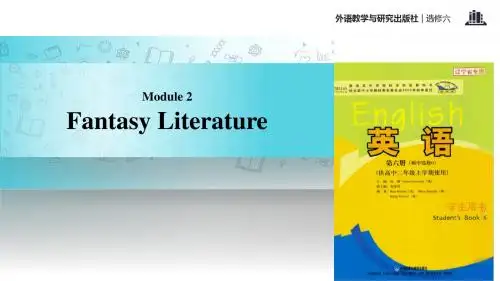
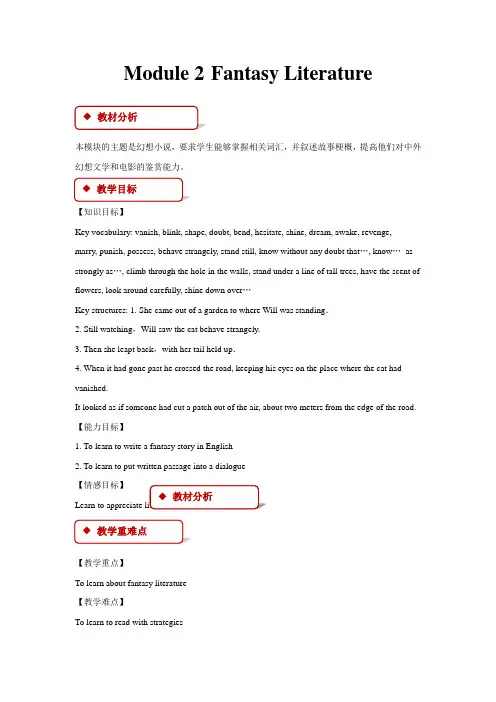
Module 2 Fantasy Literature本模块的主题是幻想小说,要求学生能够掌握相关词汇,并叙述故事梗概,提高他们对中外幻想文学和电影的鉴赏能力。
【知识目标】 Key vocabulary: vanish, blink, shape, doubt, bend, hesitate, shine, dream, awake, revenge,marry, punish, possess, behave strangely, stand still, know without any doubt that …, know … as strongly as …, climb through the hole in the walls, stand under a line of tall trees, have the scent of flowers, look around carefully, shine down over …Key structures: 1. She came out of a garden to where Will was standing .2. Still watching ,Will saw the cat behave strangely.3. Then she leapt back ,with her tail held up .4. When it had gone past he crossed the road, keeping his eyes on the place where the cat had vanished.It looked as if someone had cut a patch out of the air, about two meters from the edge of the road.【能力目标】1. To learn to write a fantasy story in English2. To learn to put written passage into a dialogue【情感目标】【教学重点】To learn about fantasy literature【教学难点】To learn to read with strategiesTape recorder, MultimediaStep 1. Introduction & Reading1. Introduce Philip Pullman and his work to students.2. Read the short introduction and fill in the blanks..3. DiscussionHave you read His Dark Materials? If not, would you like to read it? Say why or why not. Have you read a Harry Potter novel or seen one of the films? If you have, did you enjoy it? Say why or why not.Step 2. Reading and vocabulary1. Read the passage and number the sentences in the correct order.2. Read the passage summarize the main idea of the passage.3. True or False4. Read the passage again and choose the best answers.5. Find the answers in the text.Step 3. Language points1. Useful phrases2. words philosophical, vanish, behave etc.Step 4. Listening and reading1. Before listening, look at some pictures and guess what the story is about.2. Put the sentences in the correct order.3. Listen to the tape, and check your answers.4. Fill in the blanks with right words from Activity 3.5. Answer the questions about the story.Step 5. Vocabulary and reading1. Introduce J.K.Rowling and Harry Potter film series2. Read the passage and answer these questions.。
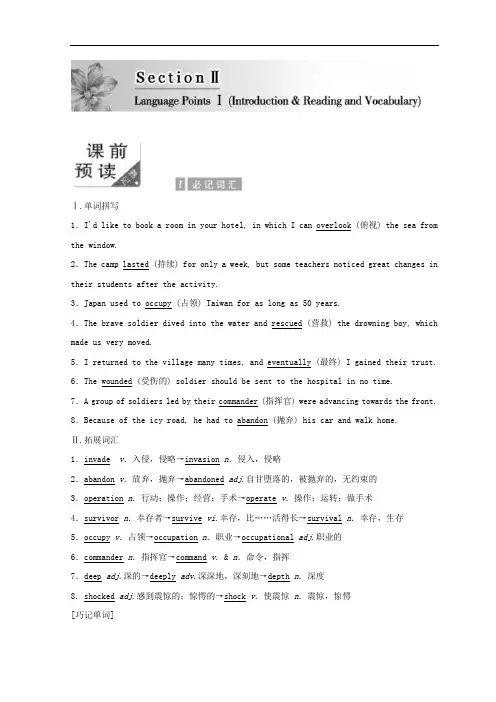
Ⅰ.单词拼写1.I'd like to book a room in your hotel, in which I can overlook (俯视) the sea from the window.2.The camp lasted (持续) for only a week, but some teachers noticed great changes in their students after the activity.3.Japan used to occupy (占领) Taiwan for as long as 50 years.4.The brave soldier dived into the water and rescued (营救) the drowning boy, which made us very moved.5.I returned to the village many times, and eventually (最终) I gained their trust. 6.The wounded (受伤的) soldier should be sent to the hospital in no time.7.A group of soldiers led by their commander (指挥官) were advancing towards the front. 8.Because of the icy road, he had to abandon (抛弃) his car and walk home.Ⅱ.拓展词汇1.invade v.入侵,侵略→invasion n.侵入,侵略2.abandon v.放弃,抛弃→abandoned adj.自甘堕落的,被抛弃的,无约束的3.operation n.行动;操作;经营;手术→operate v.操作;运转;做手术4.survivor n.幸存者→survive vi.幸存,比……活得长→survival n.幸存,生存5.occupy v.占领→occupation n.职业→occupational adj.职业的6.commander n.指挥官→command v. & n.命令,指挥7.deep adj.深的→deeply adv.深深地,深刻地→depth n.深度8. shocked adj.感到震惊的;惊愕的→shock v.使震惊n.震惊,惊愕[巧记单词]词根词形变化构词点拨command commander 动词加er构成副词operate operation 动词去e加(t)ion构成名词Ⅲ.补全短语1. at the same time 同时2.take place 发生3. at one point 一度,在某一时刻4.declare war on 对……宣战5.take part in 参加6.get off 下车/船/飞机7.make a breakthrough 取得重大突破(进展)8.pick up 停下来让某人搭车(船等);救起9.as a result 结果,因此10.be situated on 位于,坐落在1.[教材原句]The operation was extremely dangerous and many soldiers were killed before they even got off the boats.这次登陆行动异常危险,很多士兵还没来得及下船就牺牲了。
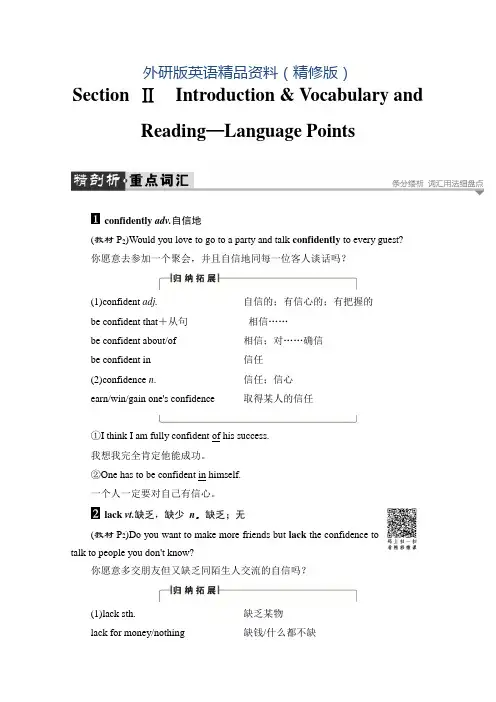
外研版英语精品资料(精修版)Section ⅡIntroduction & Vocabulary and Reading—Language Pointsconfidently adv.自信地(教材P2)Would you love to go to a party and talk confidently to every guest?你愿意去参加一个聚会,并且自信地同每一位客人谈话吗?(1)confident adj.自信的;有信心的;有把握的be confident that+从句相信……be confident about/of 相信;对……确信be confident in 信任(2)confidence n. 信任;信心earn/win/gain one's confidence 取得某人的信任①I think I am fully confident of his success.我想我完全肯定他能成功。
②One has to be confident in himself.一个人一定要对自己有信心。
lack vt.缺乏,缺少n.缺乏;无(教材P2)Do you want to make more friends but lack the confidence totalk to people you don't know?你愿意多交朋友但又缺乏同陌生人交流的自信吗?(1)lack sth. 缺乏某物lack for money/nothing 缺钱/什么都不缺(2)lack n. 缺少,缺乏the/a lack of... ……不足for lack of 因缺乏……(3)lacking adj.缺少的,缺乏的be lacking in 缺乏;没有①Lack of money is the root of all evil.缺乏金钱是万恶之源。
②He is lacking in responsibility.他缺乏责任心。
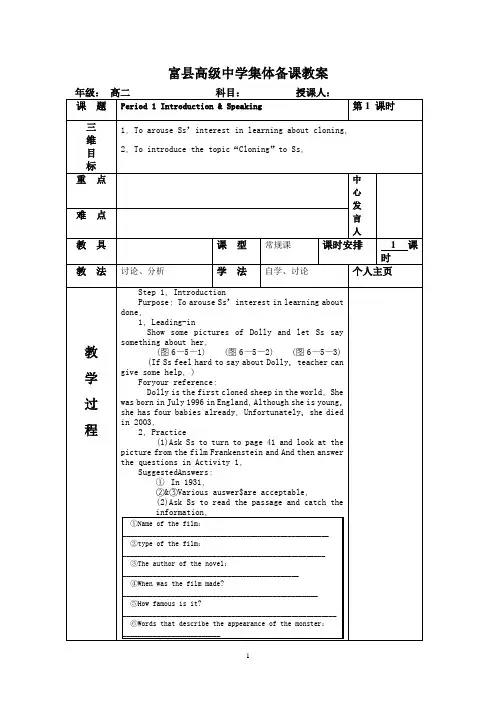
富县高级中学集体备课教案
附注:课型填“常规课”或“复习课”或“习题课”或“多媒体课”。
富县高级中学集体备课教案
附注:课型填“常规课”或“复习课”或“习题课”或“多媒体课”。
富县高级中学集体备课教案
附注:课型填“常规课”或“复习课”或“习题课”或“多媒体课”。
富县高级中学集体备课教案
附注:课型填“常规课”或“复习课”或“习题课”或“多媒体课”。
富县高级中学集体备课教案
附注:课型填“常规课”或“复习课”或“习题课”或“多媒体课”。
富县高级中学集体备课教案
附注:课型填“常规课”或“复习课”或“习题课”或“多媒体课”。
21。
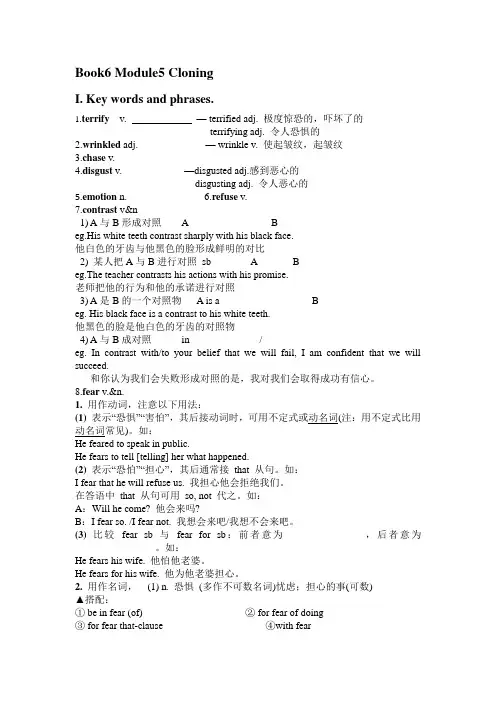
Book6 Module5 CloningI. Key words and phrases.1.terrify v. — terrified adj. 极度惊恐的,吓坏了的terrifying adj. 令人恐惧的2.wrinkled adj. _____________— wrinkle v. 使起皱纹,起皱纹3.chase v. _____________4.disgust v. ____________—disgusted adj.感到恶心的disgusting adj. 令人恶心的5.emotion n. __________6.refuse v. _________7.contrast v&n __________1) A与B形成对照A_________ _____ Beg.His white teeth contrast sharply with his black face.他白色的牙齿与他黑色的脸形成鲜明的对比2) 某人把A与B进行对照sb _______ A_______Beg.The teacher contrasts his actions with his promise.老师把他的行为和他的承诺进行对照3) A是B的一个对照物 A is a ________ _________ Beg. His black face is a contrast to his white teeth.他黑色的脸是他白色的牙齿的对照物4) A与B成对照in ________ _____/______eg. In contrast with/to your belief that we will fail, I am confident that we will succeed.和你认为我们会失败形成对照的是,我对我们会取得成功有信心。
8.fear v.&n.1.用作动词,注意以下用法:(1) 表示“恐惧”“害怕”,其后接动词时,可用不定式或动名词(注:用不定式比用动名词常见)。
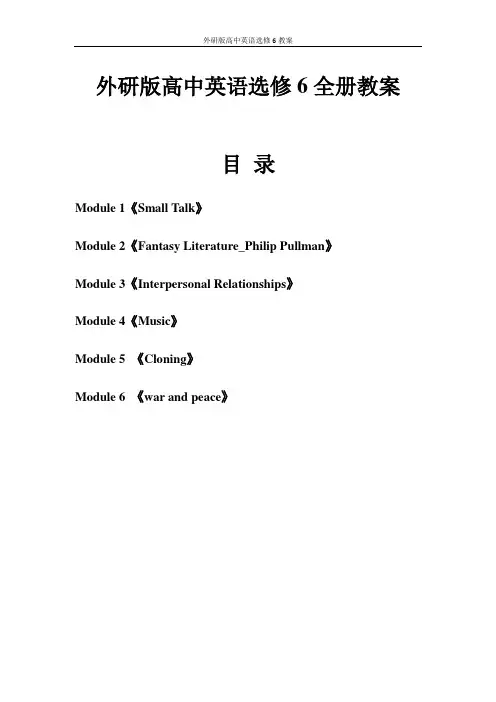
外研版高中英语选修6全册教案目录Module 1《Small Talk》Module 2《Fantasy Literature_Philip Pullman》Module 3《Interpersonal Relationships》Module 4《Music》Module 5 《Cloning》Module 6 《war and peace》Module 1 Small TalkTeaching aims:1. To introduce different social skills about talking in different culture and improve the students’ social skills.2. To know how to talk about obligation or lack of obligation.3. To master AAA talking model and to develop the friendly environment whenhaving talk with others.Important and difficult points:1. Get students to understand how to have a chat with others in English culture.2. Make students know the importance of small talk between persons.3. Help students to improve the cultural understanding skills in different countries.Teaching procedures:Step 1. In this part, the teacher can talk with students in small talk, and the teacher can choose different topic with different students.For example:T: What do you think of yesterday’s football match between your class and Class 3?S1: It’s great.S2: We won.T: Do you know why you won?S3: We are strong.T: Good. When we were discussing the football match just now, we were discussing serious things or having light conversation?Ss: Light conversation.T: Oh, yes. Just small talk.Step 2. After the teacher tell the students small talk, the students begin to read the dictionary definitions of small talk then ask the students to discuss the four questions inActivity1.Step 3. Divide the students into groups of two ones to discuss the five questions in Activity2. Then the teacher can choose some groups of students to show their smalltalk to all the students. The Ss can have different opinions, but they must give the reason for their opinions.Step 4. Make a talk between the Ss and the teacher, then introduce the topic about must, have to, don’t have to and mustn’t.For example:T: You are now in Senior Two, and I think you are all good students, although some of you sometimes behave not very properly. So I’m going to ask you some questions. Do you think students have to be on time at school?Ss: …T: Oh, yes. You are right. You have to. Then say something that you must do.S1: …S2: …T: And anything you mustn’t do?S1: …S2:…Ask the Ss to talk about the following topics:What is obligation?What is lack of obligation?According to the talking method, the teacher can introduce the definitions of obligation and lack of obligation.Step 5. Ask the students to finish Activity1 and then let the Ss to talk about the answers they have made.Ask the Ss to make similar sentences impressing obligation and lack of obligation using the words they just practiced.Step 6. Make a competition among the Ss to make sentences using must, have to, don’t have to, mustn’t, needn’t do and don’t need do. And the team which make sentences will win the competition.Step 1. Ask Ss to discuss the sentences in Activity 1 and then check the answers of the Ss’. Then learn the words in this part with the Ss.Step 2. Ask the Ss to read the text quickly and then finish Activity2. Then ask all the Ss to discuss the questions of Activity 4. Then ask the Ss to tell us the usage of the words in Activity1 and Activity 4 and find the sentences in the text: impress, damage, encourage, prepare, avoid, lack, recognize, smile.Step 3. Ask the students to read the text again, then answer the questions in Activity3 and encourage the Ss to have different answers. If the time isn’t enough, we can solve the problem in the following ways.(1)Discuss it after class.(2)Discuss the following questions as the important points.I.What do people think about those who talk too much?II.Why is it a good idea to nod and smile when the other person is talking?III.What does the quotation from Benjamin Disraeli tell you about people? Then ask the Ss to prepare for Activity5 and then ask the Ss to tell the meanings of the phrases.Step 4. Important word or phrases1. Which definitions make small talk sound like a positive thing?Sound is a link verb,its meaning in Chinese:听起来。
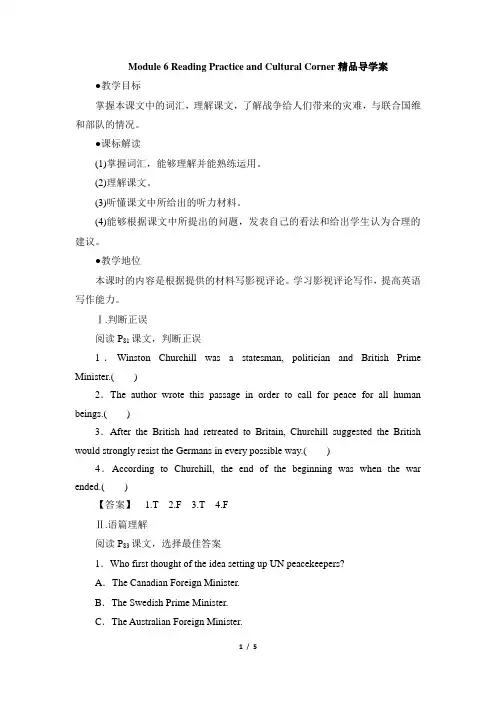
Module 6 Reading Practice and Cultural Corner精品导学案●教学目标掌握本课文中的词汇,理解课文,了解战争给人们带来的灾难,与联合国维和部队的情况。
●课标解读(1)掌握词汇,能够理解并能熟练运用。
(2)理解课文。
(3)听懂课文中所给出的听力材料。
(4)能够根据课文中所提出的问题,发表自己的看法和给出学生认为合理的建议。
●教学地位本课时的内容是根据提供的材料写影视评论。
学习影视评论写作,提高英语写作能力。
Ⅰ.判断正误阅读P81课文,判断正误1.Winston Churchill was a statesman, politician and British Prime Minister.()2.The author wrote this passage in order to call for peace for all human beings.()3.After the British had retreated to Britain, Churchill suggested the British would strongly resist the Germans in every possible way.()4.According to Churchill, the end of the beginning was when the war ended.()【答案】 1.T 2.F 3.T 4.FⅡ.语篇理解阅读P83课文,选择最佳答案1.Who first thought of the idea setting up UN peacekeepers?A.The Canadian Foreign Minister.B.The Swedish Prime Minister.C.The Australian Foreign Minister.2.Why were the armed UN peacekeepers sent to the Middle East in 1957?A.Because they wanted to see what was happening there.B.Because they wanted to protect the Suez Canal.C.Because they wanted to settle a dispute about the Suez Canal.3.From the passage we can conclude that________.A.there were more international disputes before 2000B.there were less international disputes during the 1990sC.there were more international disputes after 20004.Which of the following is NOT right?A.The UN peacekeepers wear sky-blue helmets.B.The UN peacekeepers are soldiers sent from diffident countries?C.All UN peacekeeping operations are not successful.【答案】 1.A 2.C 3.C 4.C考点精讲1.encourage n.鼓舞,鼓励But Churchill encouraged people that this was only a temporary defeat in a speech which included the words, “We shall fight on the beaches, we shall fight on the landing grounds, we shall fight in the fields and in the streets, we shall fight in the hi lls; we shall never surrender.” (P81)但是丘吉尔告诉人们这只是临时的失败,他在演讲中说:“我们会在海岸上战斗,我们会在陆地上战斗,我们会在田野里和街道上战斗,我们会在山间战斗;我们永远不投降。
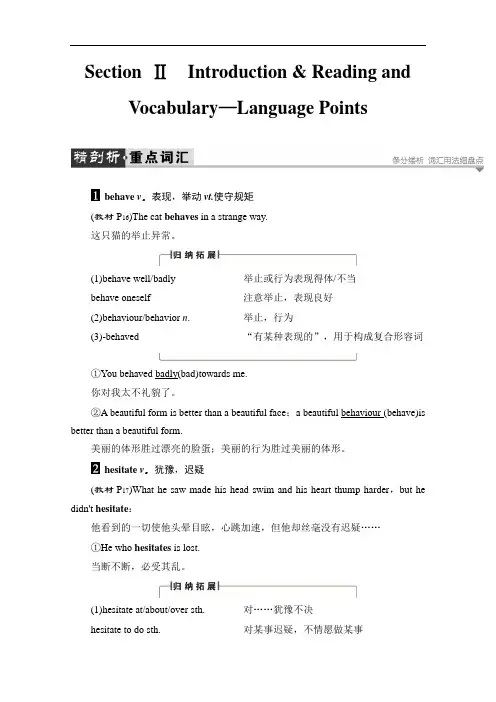
Section ⅡIntroduction & Reading and Vocabulary—Language Pointsbehave v.表现,举动vt.使守规矩(教材P16)The cat behaves in a strange way.这只猫的举止异常。
(1)behave well/badly 举止或行为表现得体/不当behave oneself 注意举止,表现良好(2)behaviour/behavior n. 举止,行为(3)-behaved “有某种表现的”,用于构成复合形容词①You behaved badly(bad)towards me.你对我太不礼貌了。
②A beautiful form is better than a beautiful face;a beautiful behaviour (behave)is better than a beautiful form.美丽的体形胜过漂亮的脸蛋;美丽的行为胜过美丽的体形。
hesitate v.犹豫,迟疑(教材P17)What he saw made his head swim and his heart thump harder,but he didn't hesitate:他看到的一切使他头晕目眩,心跳加速,但他却丝毫没有迟疑……①He who hesitates is lost.当断不断,必受其乱。
(1)hesitate at/about/over sth. 对……犹豫不决hesitate to do sth. 对某事迟疑,不情愿做某事(2)hesitation n. 犹豫,迟疑without hesitation 毫不犹豫地(3)hesitant adj.犹豫的,踌躇的②Don't hesitate to tell(tell) us if you have a problem.你有问题就直截了当地告诉我们。
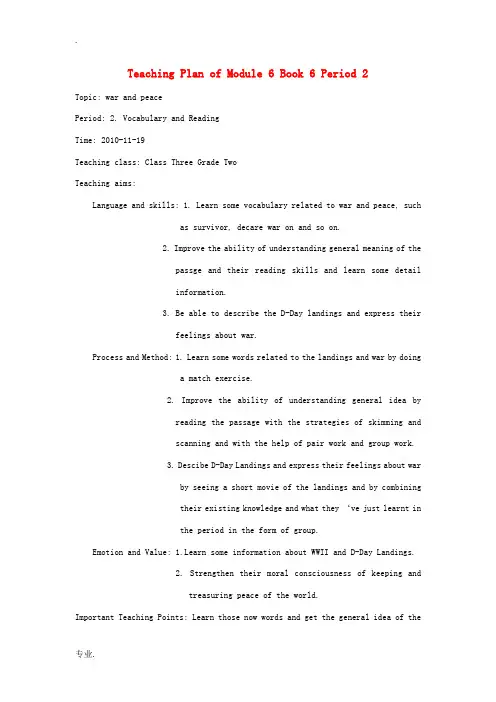
Teaching Plan of Module 6 Book 6 Period 2Topic: war and peacePeriod: 2. Vocabulary and ReadingTime: 2010-11-19Teaching class: Class Three Grade TwoTeaching aims:Language and skills: 1. Learn some vocabulary related to war and peace, suchas survivor, decare war on and so on.2. Improve the ability of understanding general meaning of thepassge and their reading skills and learn some detailinformation.3. Be able to describe the D-Day landings and express theirfeelings about war.Process and Method: 1. Learn some words related to the landings and war by doinga match exercise.2. Improve the ability of understanding general idea byreading the passage with the strategies of skimming andscanning and with the help of pair work and group work.3. Descibe D-Day Landings and express their feelings about warby seeing a short movie of the landings and by combiningtheir existing knowledge and what they ‘ve just learnt inthe period in the form of group.Emotion and Value: 1.Learn some information about WWII and D-Day Landings.2. Strengthen their moral consciousness of keeping andtreasuring peace of the world.Important Teaching Points: Learn those now words and get the general idea of thepassage.Difficult Teaching Points: Enable the studentgs to describe D-Day Lanings andexpress their feelings about war using what they havelearned in this period.Teaching methods: Task-based learning and teaching method; Inspiration andcreation task; showing moving; brainsrotming; skimmingand scanning; group work to discuss the topic. Teaching tools: a computer, a projector, a blackboard and some chalk. Teaching ProcuduresStep I Revision and Leading-inDo a revision about the famous quotations about war and peace and the second world war and then show two pictures of D-Day Landings. Ask students to tell what kind of peole are in the pictures and what they are doing. Then lead to the passage of D-Day Landings.Step II Pre-reading1 Ask the students to read some key expressions after the teacher to get the right prononciation and then try to match the meaning with the word.2 Check the answers.Step III ReadingTask i SkimmingAsk students to read the three short passages quickly and match each part with their main idea.Task ii Scanning 1 Passage 11.Ask students to read the passage 1 carefully in three minutes to find someinformation about WWII and about D-Day Landings.2.Check the answers.Task iii Scanning 2 Passage 21.Give students three minutes to scan the passage with the task of answering somequestion.2.Show them a short piece of video about the landing of Normandy in the film SavingPrivate Rane. Students should describe what they have seen or what happened during the landing.Task iv Scanning 3 Passage 31.Reading the passage 3 carefully to answer some questions about 60 years afterthe landings.2.Learn the poem on the war memorial together to sense the meaning and the messageit sends.Step IV Post-readingFour students in a group discuss what they think of the D-Day Landings and what are their feelings about war. Then report the results to the class by the groupleader. Step V summaryProvide the chance for students to summarize and self-evaluate their learning results.Step VI HomeworkWrite a short essay about D-Day Landings and express their feelings about war with about 120 words.。
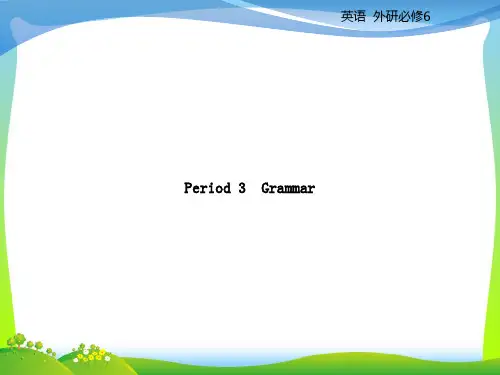
Period 3: Speaking—Telling the story of The Cat That Vanished ObjectivesTo learn to put written passage into a dialogue●Procedures▇ Retelling the story in your own wordsHello, class. This time we shall try to retell the story we have just read in our own words.A: Have you seen the film called The Cat That vanished?B: No, I haven’t. Tell me about it in English.A: The film begins at one night when there was very little traffic.B: It’s terrible.A: And the road where a man was standing was quiet,with comfortable houses,and trees along both sides of the road.B: What is the name of the man?A: He is Will by name.B: How was Will then?A: He was so tired that he could not think clearly but as he stood trying to decide what to do,he saw a cat.B: A cat? What a strange thing to be seen at night!A: She came out of a garden to where Will was standing. Will held out his hand, and the cat came up to him. Then she turned away and went across the road,towards the bushes just past the trees,and there she stopped.B: What about Will? What was he doing?A: Still watching. All of a sudden, Will saw the cat behave strangely.B: how did she behave?A: She put out a paw to pat something in the air in front of her,something that was invisible to Will.Then she leapt back,with her tail held up.B: Did Will know about cats?■Reading and retelling a fantasy storyYou have done a very good job. Now read another short fantasy story entitled The Price of Power by Benjamin Anible, aged 13, Houghton, Michigan. And then try to retell it in your own words.。
Book 6 Module 2 Fa ntasy Literature Period 1 In troduct ion and Read ing 教学设计课题名称:Book 6 Module 2 Fa ntasy LiteraturePeriod 1---In troduct ion and Read ing教材版本:外研版授课时间:45分钟、学生分析所任教班级是高二(1 )班,一个物理实验班,共有54人,其中女生19人,男生35人。
在英语学习方面,两极分化比较大,其中也有部分学生来自于农村或平行班,相对内向,语音语调不准,英语基础较 弱,不敢大胆开口说。
但大部分学生对英语学习的热情很高,有一定的英语基础和较强的表现欲和表达能 力。
能积极参与课堂的活动,思维活跃,配合老师的教学,师生关系融洽。
在课堂教学中,努力激发学生 参与教学活动的热情,积极思考,相互讨论,共同协作。
b5E2RGbCAP二、教材分析本课时所教的是外研版高二上学期使用的选修六 Module2 Fantasy Literature 中Introduction andReading 部分的内容,是本模块的第一课时。
p1EanqFDPwIntroduction 中的内容都围绕 Philip Pullman 的小说 His Dark Materials 展开。
DXDiTa9E3d第一项内容简介 Philip Pullman 的His Dark Materials ,借此引出话题 a fantasy story ;第二项内 容学习短文中的生词和短语;第三项内容是对Philip Pullman 的His Dark Materials 以及其他的fantasystories 进行深入讨论。
RTCrpUDGiTReading and Vocabulary 是一篇题为 The Cat That Vanished 的 fantasy story Pullman ' s second book named The Subtle Knife in the His Dark Material trilogy文,学生可进一步理解fan tasy story 的含义。
【本模块要求】1.词汇能力单词:1).memorial 2). grave 3). condemn 4). nationality5). rescue 6). backpack 7). afterwards 8). Bomb9). image 10). senseless 11). invade 12). beach13). survivor 14). peacekeeper 15). civilian 16). shocked17). eventually 18). commander 19). abandon 20). occupy 短语:1). declare war on 2). make a breakthrough 3). war memorial 4). to one’s astonishment 5). think about 6). be involved in7). abandon doing 8). be occupied with / in 9). come to one’s rescue 10). condemn / sentence sb. to death2.听说能力Talking about memories. 3.阅读能力阅读课文和cultural corner 中的四篇阅读文章,掌握其中的语言点。
句型:It would suffer many great defeats before it would begin to win the war. Ifthey had reached the beach, they would probably have been killed.The UN couldn’t stop a terrible civil war in the African state of Rwanda in 1995, despite warnings of the dangers from nearby states.The survivors lay on the beach, exhausted and shocked.The cemetery and memorial are situated on a cliff overlooking the beach and the English Channel, from where the boats attempts their landings.Many people believe that Churchill’s leadership inspired people to remain brave in the face of Nazi Germany. 4.语法能力Subjunctive (2)5.写作能力Write a review of a film.【词汇】1. wound n. 创伤,伤害,苦痛 v. 伤害,损害,上发条辨析:hurt,injure, harm, damage, wound1)hurt 普通用语,既可指肉体上的伤害,也可精神上,感情上的伤害。
高二英语选修6模块2语言点教案外研版选修6 模块2 语言点讲解1.She came out of a garden to where Will was standing.她从花园出来,来到威尔站立的地方。
句中where引导的是介词的宾语从句。
例如:Our success depends upon how well we can cooperate with one another.2.Still watching,Will saw the cat behave strangely. 威尔定睛看过去,看见那只猫行为怪异。
Still watching是现在分词短语作状语,表示伴随。
分词做状语时,它的逻辑主语与句子的主语一致,作状语的分词相当于一个状语从句。
例如:Hearing the news, they all jumped with joy. Using what you know of word stems and word formations, you can make a guess at the meaning of a new word. The students went out of the classroom, laughing and talking.3.Then she leapt back,with her tail held up.然后她向后跳了跳,尾巴翘的老高。
句中with引导的with独立主格结构。
结构一:with +名词(代词)+介词短语,He sat there thinking, with his chin on his hand.他手托下巴,坐在那儿沉思。
结构二:with +名词(代词)+形容词,He stared at his friend with his mouth wide open.他张大嘴巴凝视着他的朋友。
结构三:with +名词(代词)+副词,With production up by 60%, the company has had another excellent year.产量上升了60%, 公司又是一个好年景。
Module 6 War and Peace 导学案导学案一introduction, reading and vocabulary一. 思考下列问题.1) What does a war bring to people?2) Do you like war or peace in the world? Why?3) What results would be if the war broke out?二. 重点词汇.1. adj.复仇的2. v.入侵,侵略3. v.放弃,抛弃4. n.行动5. v.淹死,使溺死6. v. 持续7. v.占领8. v.使受伤9. adj.震惊的,惊骇的10. v.俯视,往下看11. v.责难,谴责12. v.营救,拯救三.重点短语.1. declare war on2. be known as3. take part in4. attempt to do sth5. think about (doing ) sth6. make a breakthrough7. pick up8. fight with9. contribution to10. be situated on11. go down四.重点句子1. If they had reached the beach, they would probably have been killed.本句是“针对过去的虚拟语气”,其形式是:If + 主语+ had +过去完成式动词+ ……:主语+ would (should, could, might) + have +过去完成式动词+……。
2. The survivors lay on the beach, exhausted and shocked.是形容词短语作伴随状语, 表示状态.“ exhausted and shocked” e. g. The boy went back home,_______________(depress).He turned away, _________________(disappoint).3. The cemetery and memorial are situated on the cliff overlooking the beach and the English Channel, from where the boats attempted their landings.overlooking the beach and the English Channel 为现在分词作后置定语._________________为介词+副词引导非限制性定语从句.五.知识点.1. demand (v.) P71(1) demand sth. 要求…e.g. The customer demanded a reasonable explanation from the company.(2) demand + to do 要求做…e.g. 他们要求被告知每件事。
外研版高中英语选修6教案篇一:高二英语外研版选修六Module 6 整个单元教案富县高级中学集体备课教案1附注:课型填“常规课”或“复习课”或“习题课”或“多媒体课”。
2富县高级中学集体备课教案345篇二:高二英语外研版选修6 Module 4教案Module 4MusicContent: IntroductionTeaching aims and teaching demands:1 Have the students know some Chinese and western instruments.2 Have the students know some knowledge about music.3 To train the students’speaking skills and listening skills through making dialogues.4 To train the students how to improve their oral English. Important and difficult points:1 How to master the names of different instruments.2 How to distinguish the Chinese and western instruments.3 How to make the students perform themselves in class and make dialogues with others in English.4 The knowledge of music and development of the students’oral English and the skills of communication. Teaching style: warming-upTeaching methods: elicitation and discussion.Teaching instruments: computer, blackboard, and lantern slide.Teaching procedures:Step I : Lead-in.? Teacher: Thank you for your sing!? Do you like singing in your spare time?? How do you feel when you finish listening to a song or singing a song?? Which subject do we study from how to sing?? Is sing equal to music?Notes: The teacher directs the students to begin this topic through their answers---singing.T: In this module, we will discuss something about music together.Step II: Warming-up..1: T: How much do you know about the world of music? 2: Ss: There are the types of music, composer, band, singers, choir, instruments and so on.3: T: What do the types of music have?4: Ss: pop music, folk music, rock music, classical music, rap music, and jazz music.Step III: The discussion about instruments.1 T: Please discuss the question with other students.①How many of the Chinese instruments and western instruments have you heard?Two minutes!2 Ss: The names of different instruments.3 T: Let’s enjoy beautiful pictures about instruments to know them detailedly.Notes: The teachers first shows different pictures about the instruments and then have the students answer what it is. If some instruments are not known by the students, the teacherwill gives information about them for the students.4 Instruments include: erhu, drum, flute, vertical bamboo flute, piano, electronic organ, saxophone, konghou and harp, guzheng, dulcimer, violin, guitar, cello, lute, pipa, mandolin, and yueqin.StepⅣ: Introduction.1 T: Have the students complete activity 1.Look at the photos of Chinese and western musical instruments and answer the questions.2 Check the answers:①All of them have strings②The pipa and the lute, the konghou and harp③The pipa, lute, yueqin, and mandolin.Notes: When the students answer the questions, the teacher needs to refer to the other instrumentswhich the students enjoyed just now.StepⅤ: Discussion.1 T: Give three questions to the students.?????? (1) How much information do you know about the artists Langlang and Twelve Girls Band? (2) Do you know any Chinese classical music pieces which feature these instruments? Eg; Liangzhu. (3) Which type of music do you like best, and why? Notes: If the students may not know them in detail, they can ask their music teacher or surf the Internet after class. Five minutes. Notes: some information bout Langlang and Twelve Girls Band: Langlang: pianist king , he was born in Shenyang city and began to study piano at the age of 3.He is the first Chinese pianist who played the piano in the White House. On 8th in August in 2008, he played the piano in the 29th Olympics in China. We are all proud of him, because we are all Chinese.? Twelve Girls Band is already one of China’s most popular groups. It is made up of a dozenbeautiful women who are among the most gifted musicians in the world. They perform on traditional Chinese instruments such as the Guzheng, the pipa and so on. Having received classical training, those twelve girls have built a musical bridge between east and west and charmedthe people of many nations around. The group shows a genuine love for all styles of music, which makes them well received all over the world.?????????? 2 Students’performances. Step Ⅵ: Homework. 1 Review the instruments which we knew in this class. 2 Prepare for the reading and vocabulary. Thank you for your cooperation! Best wishes for you ! Have a wonderful time in your life! Happiness will never leave you!篇三:【教材全解】2014-2015学年高中英语外研版选修六教案:M6 Period 6Period 6 Workbook.Task.Module File Teaching Goals:1.To deal with the exercises in the Workbook.2.To enable Ss to make a conclusion of thismodule.Teaching Procedures:Step 1.Revision Purpose:To deal with the exercises in the Workbook.First,check Ss whether they have finished the exercises in the Workbook.And then give some instruction of the exercises.Step 2.TaskPurpose:To help Ss to express their opinions about war.Ask Ss to write down their opinions about war on the blackboard.Step 3.Module FilePurpose:To enable Ss to make a conclusion of this module and to deepen what we have learned in the module.Ask Ss to look at Module File and try to recall what they have learnt.Then tick the things they are sure that they know and put a question mark next to the points they are not sure of and a cross to what they don’t know.Help Ss to share their ideas and deal with the difficult or confusing points.Step 4.Assessment1.Individual work for self-assessmentT:In this module.you have learnt something about War and peace.HowReflectionI learnt_________1 would like to know about _________ I’m still not sureabout __________ I’m confused about________________ 2.Group work- 1 -- 2 -篇四:高二英语外研版选修6 module 1 small talk教案Module1 Small TalkWords and expressions1. lack v 缺乏,没有The problem is which companies lack the latest equipment. They sitill lack experience\ confidence.lack n 缺乏,不足There has been a great lack of water in this summer. There is a lack of modern equipment here; I shall have to go to Guangzhou to briing some in.Phrases:lacking adj 缺乏的,不足的be lacking in 缺少----,没有----for\ through lack of 因缺乏---2. advanceadj 预先的,在前的,事先的Please give us advance warning of any changes to the schedule.vtadvance a suggestion 提出,建议advance prices 提高(价格),提升(某人)The teacher has done his best to ~the students’interest in English.(促进)The date of the meeting was advanced by 4 days.(将----提前)vi 前进;取得进展;被提升;物价等上涨,增加~ agains\ on\ upon the enemy 向敌人前进~ in skills 在技巧方面取得提高He advanced rapidly in his job.使升迁,被晋升~ in ages 年岁大起来n.they have made great advances. 进步Nothing could stop the advance of the soldiers.前进I was given an advance of a month’s pay. 预付advanced adj 高级的,先进的,高等的in advance 预先,事先pay in advancein advance of 在-----前面,超前3. think of想起,回想起We often think of you.This made us think of our days in the army.考虑,认为(think of sb\sth ------ as sth)They’re thinking of\ about buying a new car.What do you think of\ about the film?phrases.think about思索考虑think out仔细考虑盘算think over 仔细考虑think to oneself 心中想think up想出,发明think twice 再三考虑So far this is the best way I’ve thought of ________ this problem. (to settle)4. look away (from) 把目光从------移开,把脸转过去She looked away in embarrassment.The sunlight on the water was so dazzling that people had to look away.phraseslook intolook after look down upoon look throughlook up look out5. in addition 此外,并且;做副词使用,其后不接其他成分in additon to 除了---之外(还)做介词使用,后接名词或代词做宾语My mother gave me sandwiches for my lunch and a bag of milk in addition.In addition to English, he has studied a second foreign language.6. find out了解,认识到We became so interested in her story that we decided to find out more about her.We should find out what the masses think .找出,查明,弄清楚I must ring them up and find out if Xiao Wu is there.They have to find out how to bring about improvement. 7. opportunity 机会,良机make an (the) opportunity of doing (或to do) 创造做某事的机会at \ on the first ~ 一有机会就---have little(no, not much, an ) 很少有,没有,有不多的,有机会做某事in search of new opportunities 寻求新的机会I take this opportunity oof thanking you.8. applicationn.申请,申请书,请求They accepted my application to join the club.Please complete this job application form carefully.应用,运用,涂抹,敷用The application of new scientific discoveries to industrial production usually improves efficiency. 把新的科学发现运用到工业生产当中,通常可以提高效率。
Ⅰ.单词拼写1.I'd like to book a room in your hotel, in which I can overlook (俯视) the sea from the window.2.The camp lasted (持续) for only a week, but some teachers noticed great changes in their students after the activity.3.Japan used to occupy (占领) Taiwan for as long as 50 years.4.The brave soldier dived into the water and rescued (营救) the drowning boy, which made us very moved.5.I returned to the village many times, and eventually (最终) I gained their trust. 6.The wounded (受伤的) soldier should be sent to the hospital in no time.7.A group of soldiers led by their commander (指挥官) were advancing towards the front. 8.Because of the icy road, he had to abandon (抛弃) his car and walk home.Ⅱ.拓展词汇1.invade v.入侵,侵略→invasion n.侵入,侵略2.abandon v.放弃,抛弃→abandoned adj.自甘堕落的,被抛弃的,无约束的3.operation n.行动;操作;经营;手术→operate v.操作;运转;做手术4.survivor n.幸存者→survive vi.幸存,比……活得长→survival n.幸存,生存5.occupy v.占领→occupation n.职业→occupational adj.职业的6.commander n.指挥官→command v. & n.命令,指挥7.deep adj.深的→deeply adv.深深地,深刻地→depth n.深度8. shocked adj.感到震惊的;惊愕的→shock v.使震惊n.震惊,惊愕[巧记单词]Ⅲ.补全短语1. at the same time 同时2.take place 发生3. at one point 一度,在某一时刻4.declare war on 对……宣战5.take part in 参加6.get off 下车/船/飞机7.make a breakthrough 取得重大突破(进展)8.pick up 停下来让某人搭车(船等);救起9.as a result 结果,因此10.be situated on 位于,坐落在1.[教材原句]The operation was extremely dangerous and many soldiers were killed before they even got off the boats.这次登陆行动异常危险,很多士兵还没来得及下船就牺牲了。
[句型点拨]before引导的时间状语从句。
[佳句赏析]我还没来得及跟他解释任何事情,他就生气地离开了。
He had left angrily before I could explain anything to him.2.[教材原句]The survivors lay on the beach, exhausted and shocked.死里逃生的战士们躺在沙滩上,疲惫不堪,心有余悸。
[句型点拨]形容词短语作状语。
[佳句赏析]干了一天的重活,那位工人回到家,又累又饿。
After a whole day's heavy work, the old worker returned home, tired and hungry. 3.[教材原句]After an hour and fortyfive minutes, six of the survivors tried to climb up the cliff to get off the beach. Four were too exhausted to reach the top.一小时四十五分钟后,六位幸存的战士试图爬上悬崖以离开海滩。
其中四名战士由于筋疲力尽未能攀上顶端。
[句型点拨]too ... to ...“太……而不能……”。
[佳句赏析]站在校长面前,这个男孩太害怕了而说不出话来。
Standing before the headmaster, the boy was too frightened to speak.1.In September 1939, Britain declared war on Germany after Germany invaded Poland.(P72) 1939年9月,英国在德国入侵波兰后向德国宣战。
★declare war on向……宣战(1)declare for/against 宣布赞成/反对declare sb. to be 宣布某人为……declare ... open 宣布……开幕declare oneself 发表意见;表明身份(2)declaration n. 宣告,宣布,公告①The country had no choice but to declare war on their enemy.这个国家别无选择,不得不向他们的敌人宣战。
②Our government declared against this plan.我们的政府声明反对这项计划。
③He declared himself to be a secret agent.他公开了自己是一个秘密间谍的身份。
[易混辨析]选用上述词语填空④They announced that they would get married on October 1.⑤The use of certain chemicals has now been declared illegal.2.During the war, Germany occupied many countries, including France.(P72)二战中,德国侵占了包括法国在内的许多国家。
★occupy v.占领,占据(时间、空间、某人头脑等);使忙碌①The big table occupies too much room.这张大桌子占了太多空间。
(1)occupy oneself with/in ... 忙于……;专心于……occupy one's mind/thought/attention 占据某人的头脑/思维/注意力(2)occupied adj. 已占用的;无空闲的;在使用的be occupied with/in ... 忙于……;专心于……keep sb. occupied with sth./(in) doing sth.使某人忙碌于(做)某事(3)occupation n. 占领;职业②Occupy yourself with/Keep yourself occupied with something interesting and you will not feel bored.忙于一些有趣的事情,你就不会厌烦了。
③Occupied with her children, Mrs White can't go shopping with us.因为忙于照顾孩子,怀特夫人不能和我们一起去购物。
④She occupied her mind with pleasant thoughts of the vacation.她沉浸在对假期的美好想象之中。
3.The operation was extremely dangerous and many soldiers were killed before they even got off the boats.(P72)这次登陆行动异常危险,很多士兵还没来得及下船就牺牲了。
★before引导的时间状语从句,在此句中before意为“还没来得及……就……”。
①He rang off before I could explain.我还没来得及解释,他就挂电话了。
it was+时间段+before ... 多长时间后就/才……it will be+时间段+before ... 多长时间后就/才……it was not long before ... 不久就……it will not be long before ... 不久就会……②It was three days before he came back.过了三天他才回来。
③It will not be long before we get used to the new school life.不久我们就会习惯新的学校生活。
4.The situation at Omaha Beach was so bad that the US army commanders thought about abandoning the invasion.(P72)奥马哈海滩的形势非常严峻,以至于美军司令官都考虑放弃进攻了。
★abandon v.放弃,抛弃,中止,陷入,沉湎于 n.放任,放纵①They had to abandon the match because of rain.因为下雨,他们不得不中止了比赛。
②We should not abandon a friend who is in danger.我们不应该抛弃处于危险之中的朋友。
(1) abandon (doing) sth. 放弃(做)某事abandon oneself to ... 沉溺于……,放纵……abandon one's post/hope/plan/idea放弃职位/希望/计划/主意with abandon 放纵地;尽情地(2)abandoned adj. 被抛弃了的;废弃的;放纵的③Mother often warns me not to abandon myself to playing(play) computer games.妈妈经常警告我不要沉迷于玩电脑游戏。